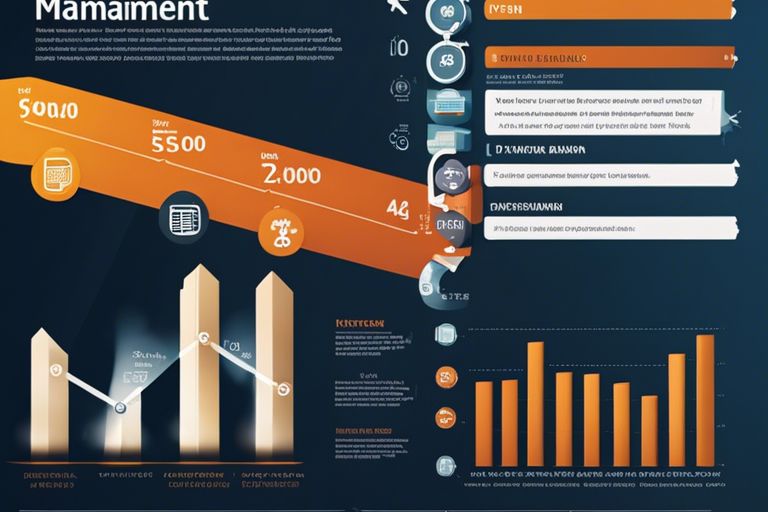Just as the digital world evolves, so does the way we manage our finances. In today’s fast-paced world, mastering digital financial management is crucial for financial success, security, and organization. Whether you are new to digital finance or looking to enhance your skills, these crucial how-to tips will help you navigate the complexities of managing your finances online with confidence and precision.
Key Takeaways:
- Automate financial processes: Implementing automated systems for tasks such as invoicing, expense tracking, and payroll can save time and reduce human error.
- Utilize cloud-based financial tools: Cloud-based software allows for real-time collaboration, remote access, and secure data storage, enhancing financial management efficiency.
- Regularly analyze financial data: Reviewing financial reports, cash flow statements, and key performance indicators can provide valuable insights for informed decision-making and strategic planning.
Embracing the Digital Shift in Financial Management
Understanding the Digital Financial Ecosystem
For organizations to thrive in today’s digital age, it is crucial to understand the digital financial ecosystem. Some key components include online banking, mobile payment platforms, digital wallets, and cryptocurrencies. These elements collectively shape the way financial transactions are conducted, offering convenience and efficiency to users.
Key Factors Driving Digital Finance Transformation
Financial institutions and businesses are constantly evolving to adapt to the digital landscape. Some key factors influencing this transformation include
- increased connectivity
- technological advancements
- changing consumer preferences
- regulatory changes
Recognizing the importance of these factors is crucial for organizations to stay competitive and meet the evolving needs of their customers.
This digital revolution has paved the way for more efficient processes, improved customer experiences, and innovative financial solutions. However, it also introduces risks such as cybersecurity threats, data breaches, and fraud. It is important for organizations to implement robust security measures and compliance protocols to safeguard sensitive financial information and maintain trust with their customers.
Building a Robust Digital Financial Framework
While managing your finances traditionally was a cumbersome task, embracing digital solutions can significantly streamline the process. Building a robust digital financial framework is necessary for your financial well-being in today’s digital age.
How to Assess Your Digital Readiness
Digital financial management requires a certain level of technological proficiency. Assess your current digital readiness by evaluating your comfort level with using finance management apps, online banking services, and digital payment methods. Identify areas where you may need to upskill to fully leverage digital tools for financial management.
Tips for Implementing Effective Financial Technologies
An effective financial technology implementation strategy is crucial for maximizing the benefits of digital financial management. Consider the following tips:
- Research and choose the right tools: Select financial management tools that align with your specific needs and goals.
- Integrate automation: Automate recurring tasks such as bill payments and savings transfers to save time and reduce the risk of human error.
- Ensure data security: Protect your sensitive financial information by using reputable and secure financial technology platforms.
With the right approach, implementing financial technologies can revolutionize your financial management practices. Any organization, from individuals to businesses, can benefit from the efficiency and accuracy that digital tools offer.
Optimizing Financial Operations with Digital Tools
All Essential Tips for Startup Success in 2023 revolve around leveraging digital tools to enhance financial operations. From accurate financial reporting to streamlined budgeting and forecasting processes, digital tools play a crucial role in optimizing financial management.
How to Enhance Accuracy and Efficiency in Financial Reporting
Even the smallest errors in financial reporting can have significant consequences on a company’s bottom line. By leveraging digital tools such as accounting software and data analytics, organizations can improve the accuracy and efficiency of their financial reporting processes. These tools can help automate tedious tasks, reduce human error, and provide real-time insights into financial performance.
Tips for Streamlining Budgeting and Forecasting Processes
For organizations looking to enhance their budgeting and forecasting processes, digital tools are crucial. By utilizing financial planning and analysis software and business intelligence tools, companies can streamline their budgeting and forecasting workflows, improve accuracy, and make more informed decisions.
- Utilize cloud-based software for collaboration and accessibility
- Implement automated tools for data collection and analysis
- Enhance forecasting accuracy with predictive analytics
This approach can help organizations allocate resources more effectively, identify potential risks and opportunities, and drive overall business growth. This streamlined approach to budgeting and forecasting can lead to more efficient financial management and better decision-making.
Navigating the Security Landscape of Digital Finance
How to Protect Your Financial Data Online
Not taking the necessary precautions to safeguard your financial data online can lead to devastating consequences. Clearly, the digital world offers convenience and efficiency, but it also poses significant risks to your sensitive information. To protect yourself, always use secure passwords, enable two-factor authentication, and avoid accessing financial accounts on public Wi-Fi networks.
Tips for Compliance and Risk Management in the Digital Age
Digital finance introduces a new set of challenges for compliance and risk management.
- Regularly update your software and security systems to stay ahead of potential threats.
- Conduct regular audits of your financial data to ensure compliance with regulations.
- Invest in cyber insurance to mitigate financial losses in case of a security breach.
Perceiving the importance of staying proactive in managing compliance and risk is crucial in the digital financial landscape.
Another critical aspect to consider in navigating the security landscape of digital finance is the evolving nature of cyber threats. Implementing robust encryption protocols and regularly monitoring your accounts for suspicious activity are key measures to protect your financial data. It’s necessary to stay informed about the latest trends in cybersecurity and adapt your security measures accordingly to stay one step ahead of cybercriminals.

Advancing Financial Growth with Data Analytics and AI
Many financial organizations are embracing the power of Data Analytics and Artificial Intelligence (AI) to drive strategic decision-making and improve overall financial performance. By harnessing the capabilities of advanced technologies, companies can gain valuable insights, streamline processes, and enhance their competitive edge in the market.
How to Leverage Data for Strategic Decision-Making
Analytics play a crucial role in transforming raw data into actionable insights for financial leaders. By utilizing sophisticated tools and algorithms, organizations can extract patterns, trends, and correlations from large datasets to make informed decisions. This data-driven approach enables companies to optimize resource allocation, identify growth opportunities, and mitigate risks effectively.
Tips for Incorporating AI in Financial Management
Any financial institution looking to stay ahead in today’s digital landscape should consider integrating AI into their financial management processes. AI technologies, such as machine learning and predictive analytics, can automate repetitive tasks, enhance fraud detection, and improve customer service. By leveraging AI, organizations can achieve greater efficiency, accuracy, and scalability in their operations.
- Implement AI-powered solutions to automate routine tasks and free up resources for more strategic initiatives.
- Utilize machine learning algorithms to analyze historical data and forecast future trends with precision.
- Enhance fraud detection capabilities by deploying AI-based systems that can identify suspicious patterns in real-time.
Thou, incorporating AI in financial management requires a comprehensive strategy, including data integration, talent development, and regulatory compliance.
Summing up
Conclusively, mastering digital financial management is crucial for individuals and businesses to thrive in the ever-evolving digital world. By following necessary how-to tips such as automating your finances, leveraging digital tools, ensuring data security, and staying informed about financial trends, you can effectively manage your finances and make informed decisions. It is important to stay proactive, adaptable, and knowledgeable in navigating the digital landscape to achieve financial success.
FAQ
Q: What is digital financial management?
A: Digital financial management refers to the integration of technology tools and software in managing personal or business finances. It involves using digital platforms to track income, expenses, investments, and overall financial health.
Q: Why is mastering digital financial management important?
A: Mastering digital financial management is crucial for ensuring better control and understanding of your finances. It allows for real-time monitoring, automated transactions, and data analysis to make informed financial decisions and achieve financial goals effectively.
Q: What are some vital tips for mastering digital financial management?
A: Some vital tips for mastering digital financial management include setting up a budget, using financial management apps, automating bill payments, regularly monitoring accounts, staying organized with digital records, and educating yourself on financial literacy to make the most of digital tools available.




